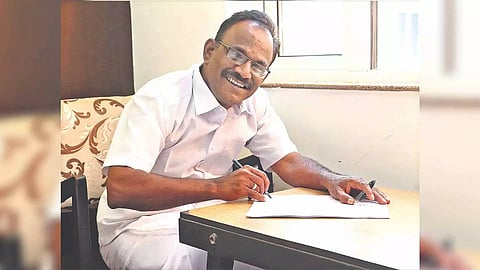

CHENNAI: The educated are more casteist. They are the ones upholding caste pride and brandishing it in different ways and means, writer Imayam said. The Sahitya Akademi winner and Dravidian writer in an interview to Shanmugha Sundaram J expressed that there is no dearth of law against caste atrocities and caste-based hate crimes in the country. But, they are mere regulators and cannot bring a change unless and until the society feels ashamed to discriminate and ill-treat fellow men and women based on caste, colour and religion. The irony is that caste is deeply and widely spread in the system, starting from the judiciary that should act against such social evils.
Though the state is known for its progressive policies, it has been witnessing numerous caste-based hate crimes and honour killings. Is the government failing to address the core issue to do away with the social malaise?
Governments, be it any government, cannot bring a change in the society by enacting laws. Caste discrimination is beyond law and it should be addressed as a sociological issue.
Society should change itself. It means a change should come within oneself, his/her thoughts and practices. It should come from each individual, family and village in the state and change would lead to egalitarian society. It can be achieved when a collective conscience emerges against discriminating against fellow men and women based on caste line, gender, or beliefs.
Education is seen as an agent for social change. But, we are seeing students fighting over caste. The recent incidents in Nanguneri and Vengaivayal are examples. What is your perspective?
Yes. The education system in the state is fundamentally flawed. Instead of helping an individual to think critically and self-evaluate to grow into a better person, it has turned out to be a mark-based model. It has been commercialised and it undermines rational thinking. Unless the education system inculcates the idea and beliefs among the student community that everyone is equal, it is a failed model. The Nanguneri incident is an example of a failed model.
There is a growing demand for an exclusive legislation against honour killing. Several political parties, particularly the VCK, are for it. What is your view on this?
I have written a novel titled ‘Pethavan’ against honour killing. It was translated in English, Telugu, Kannada and French. If a citizen does not respect and follow a legislation, it has no meaning to it. It is a sociological issue and it cannot be addressed by merely passing an Act. We are only seeing caste and overlooking intertwined factors. There are separate burial grounds, people are excluded and living in colonies till date and not allowed to step into temples. Discrimination has many forms.
Moreover, we have enough laws against caste atrocities and crimes. The problem here are the persons, who are supposed to implement the laws, are acting as enablers of casteism. Casteism is widespread in law enforcing agencies. Judiciary is not immune to social malaise. IAS, IPS officers and doctors are practicing caste. In fact, casteism is more prevalent among the educated. It reflects everywhere.
So, are you saying that political parties have no role in this? What about political parties that thrive on caste and ethnic pride?
It is unwise to pinpoint on politicians and political parties for casteism. They reflect the social structure and every political party has an agenda and wants to capture power. So, they operate according to the existing social order such as fielding a candidate from a dominant caste in the respective constituency. My question is why the educated and people in powerful positions are supporting such an agenda.
Do you consider that Dravidian parties have failed to eradicate the social malaise despite being in power since 1967?
I differ from calling the AIADMK and its government under MG Ramachandran, J Jayalalithaa and K Palaniswami as Dravidian regimes. They never talk about Dravidian icons Periyar (Thanthai Periyar) and Anna (CN Annadurai). The government under Anna, Kalaignar and MK Stalin reflected the core Dravidian ideology of establishing an egalitarian society. The ideology transformed into policies and created opportunities for oppressed sections of the society to study and come up in their life socially and economically. But, the caste system can go away only when every individual in the society feels ashamed to discriminate against the cohabitants based on caste, gender and religion.